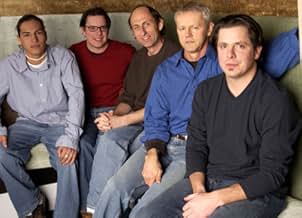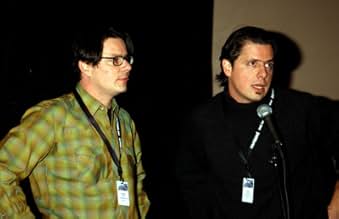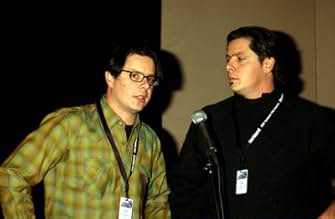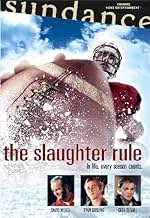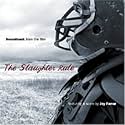AVALIAÇÃO DA IMDb
5,9/10
2,8 mil
SUA AVALIAÇÃO
Adicionar um enredo no seu idiomaA young man finds solace with a young woman, his mother, and a high-school football coach who recruits him to quarterback a six-man team.A young man finds solace with a young woman, his mother, and a high-school football coach who recruits him to quarterback a six-man team.A young man finds solace with a young woman, his mother, and a high-school football coach who recruits him to quarterback a six-man team.
- Direção
- Roteiristas
- Artistas
- Prêmios
- 2 vitórias e 2 indicações no total
John Henry Marshall
- Matt Kibbs
- (as John Henry Marshall III)
- Direção
- Roteiristas
- Elenco e equipe completos
- Produção, bilheteria e muito mais no IMDbPro
Avaliações em destaque
I don't usually find movies first by their soundtrack, but I first heard of "The Slaughter Rule" because Jay Farrar, of the late Uncle Tupelo, did the score and song selections, including by Vic Chestnutt, the Flatlanders, and the Pernice Brothers. So I was intrigued when I saw it was on Sundance Channel as it hadn't appeared on screens in New York.
The debut jointly written/directed feature of twin brothers Andrew and Alex Smith, the film has a lot of similarity to Tom Cruise's early "All the Right Moves," even down to charismatic young star Ryan Gosling clearly being a movie star hunk of the future.
Set in the brothers' home area of rugged (and very desolate) Montana in the fall, this film takes its working class football frame of athlete seeking father figure and coach conflict much further in examining maleness and the implications of the homo-eroticism of such sports much further.
It bravely (particularly by David Morse in a touchingly agonized performance) goes into the breach of what much discussion of current scandals has avoided, at the confused nexus of pedophilia and sexual identity, particularly for teen-age boys.
There's also a dollop of racial issues via the very realistically portrayed poverty of the Native Americans.
The women are mostly helpless within this overwhelmingly male environment, and their best choice for survival is just to leave, as unromantically satisfying as that is.
This ranks in the gritty tradition of sports movies as a setting to demonstrate social tensions like "Loneliness of the Long Distance Runner" than more popular fare.
The debut jointly written/directed feature of twin brothers Andrew and Alex Smith, the film has a lot of similarity to Tom Cruise's early "All the Right Moves," even down to charismatic young star Ryan Gosling clearly being a movie star hunk of the future.
Set in the brothers' home area of rugged (and very desolate) Montana in the fall, this film takes its working class football frame of athlete seeking father figure and coach conflict much further in examining maleness and the implications of the homo-eroticism of such sports much further.
It bravely (particularly by David Morse in a touchingly agonized performance) goes into the breach of what much discussion of current scandals has avoided, at the confused nexus of pedophilia and sexual identity, particularly for teen-age boys.
There's also a dollop of racial issues via the very realistically portrayed poverty of the Native Americans.
The women are mostly helpless within this overwhelmingly male environment, and their best choice for survival is just to leave, as unromantically satisfying as that is.
This ranks in the gritty tradition of sports movies as a setting to demonstrate social tensions like "Loneliness of the Long Distance Runner" than more popular fare.
Sometimes technical flaws can get in the way of what otherwise could have been a good story. These movie's flaws prevented me from enjoying it much.
First, two key deleted scenes from the start of the film leave the entire premise feeling hollow. The scenes are offered as a special feature on the DVD. If I were to watch this movie again, I'd play these two deleted scenes where they should have been. First, the scene deleted after the conversation about the teen's father that opens the movie. Second, just minutes later the continuation of a scene talking with the coach in his office.
This has been a growing trend, for directors to cut key scenes that explain things at the start of the movie. In at least commentary tracks directors have said they 'just wanted to get on with the movie'. Well of course they might, since they know the story intimately. The viewer won't, and could use the background to make an emotional connection to the movie. Unless the movie is past the two hour mark, why consider cutting valuable scenes?
Gosling and some of the other performances were great. Of course Gosling does great even in rotten movies like Murder By Numbers.
The wide screen was an overly wide aspect, I guess meant to highlight those beautiful outdoor scenes over the actors. It leaves barely enough room for actors' heads in places, and it made the brief shower scene no fun at all. To echo another comment, the sound was very poor in places. More than accents, it was bad mixing where sound jumped from soft whisphers to loud music then back. My finger ended up fiddling with the volume throughout.
In hindsight, I might watch The Slaughter Rule once, but it won't be worth watching even a second time.
First, two key deleted scenes from the start of the film leave the entire premise feeling hollow. The scenes are offered as a special feature on the DVD. If I were to watch this movie again, I'd play these two deleted scenes where they should have been. First, the scene deleted after the conversation about the teen's father that opens the movie. Second, just minutes later the continuation of a scene talking with the coach in his office.
This has been a growing trend, for directors to cut key scenes that explain things at the start of the movie. In at least commentary tracks directors have said they 'just wanted to get on with the movie'. Well of course they might, since they know the story intimately. The viewer won't, and could use the background to make an emotional connection to the movie. Unless the movie is past the two hour mark, why consider cutting valuable scenes?
Gosling and some of the other performances were great. Of course Gosling does great even in rotten movies like Murder By Numbers.
The wide screen was an overly wide aspect, I guess meant to highlight those beautiful outdoor scenes over the actors. It leaves barely enough room for actors' heads in places, and it made the brief shower scene no fun at all. To echo another comment, the sound was very poor in places. More than accents, it was bad mixing where sound jumped from soft whisphers to loud music then back. My finger ended up fiddling with the volume throughout.
In hindsight, I might watch The Slaughter Rule once, but it won't be worth watching even a second time.
This is a prime example of a flick that breaks all the rules and is still damn good. You always hear filmmakers blather on about how they work their own way, and then you see their junk and think that maybe they should have read a book. This is not one of those times. it's an intense look into sports and rural life and how they interplay with one another in the Midwest.
I was drawn to it by the title, and although it is about football, i could totally relate because when i played Youth baseball, I was on a team so bad one year that literally half of our games were called off early.
Not that this has to do totally with sports, it is more about male relationships, as Roy, the lead character deals with the death of his father through his participation in six-man football. As the story unfolds, he is cut from his own team and hooks up with a new team coached by a strange outsider played by David Morse. he starts off just being intense, but then becomes creepy (there is a homoerotic undertone between coach and player). Ryan Gosling, who plays Roy is solid and Morse is terrific. This ain't "Remember The Titans" but still very much worth checking out. It got good press at this past year's Sundance Film Festival.
I was drawn to it by the title, and although it is about football, i could totally relate because when i played Youth baseball, I was on a team so bad one year that literally half of our games were called off early.
Not that this has to do totally with sports, it is more about male relationships, as Roy, the lead character deals with the death of his father through his participation in six-man football. As the story unfolds, he is cut from his own team and hooks up with a new team coached by a strange outsider played by David Morse. he starts off just being intense, but then becomes creepy (there is a homoerotic undertone between coach and player). Ryan Gosling, who plays Roy is solid and Morse is terrific. This ain't "Remember The Titans" but still very much worth checking out. It got good press at this past year's Sundance Film Festival.
Despite the novelty of its setting, 'The Slaughter Rule' is a fairly conventional coming-of-age tale about a boy who grows into manhood by becoming a member of a ragtag six-man football team. Roy is a teenager trapped in a small Montana town whose life has not been going any too well of late. His father, with whom he had only the most casual of relationships, has been discovered dead on a railroad track, a possible suicide victim. His mother, embittered by their divorce, sleeps around with countless men and has no real inclination to provide her son with any but the most cursory form of maternal affection. On top of all this, Roy has just been rejected for the school's varsity football team because the coach finds him lacking in the kind of 'anger' he feels a player needs to be a success on the gridiron. When Roy is asked by Gid, a somewhat eccentric older man in the town, to come join his six-man football team, the youth only reluctantly acquiesces (six-man football is a near rule-less poor relation to the real game, one ostensibly only played by farm boys). It is at this point that Roy's growth into manhood begins, since it turns out that the enigmatic Gid, who one assumes will be merely a father figure for the affection-starved youth, may be seeking more than just a father/son, athlete/coach relationship with the boy.
This latent-homosexual subtext, in fact, is just about the only element that separates 'The Slaughter Rule' from countless other films in this genre. Most everything else about the film feels derivative and stale: the emotionally distant parents, the promiscuous, psychologically detached mother, the abusive stepdad, the sweet girl who wants to flee this hicksville town as fast and as far as a bus ticket can take her. Towards the end, especially, the filmmakers start to pile up the heartbreaks and tragedies, one on top of the other, almost to epic proportions. One wonders how so much can happen in so short a time to so small a group of people. In the almost two hour running time of the film, only the ambiguity of the Roy/Gid relationship arouses any real interest in the viewer.
Ryan Gosling is tremendously appealing as the troubled Roy, and David Morse (the father in 'Contact') turns Gid into a nicely sympathetic figure. The starkness of the Montana landscape also provides an appropriate backdrop for the bleak melodrama that is playing itself out in the foreground. Apart from these few quality elements, however, there isn't a whole lot else to commend in 'The Slaughter Rule.'
This latent-homosexual subtext, in fact, is just about the only element that separates 'The Slaughter Rule' from countless other films in this genre. Most everything else about the film feels derivative and stale: the emotionally distant parents, the promiscuous, psychologically detached mother, the abusive stepdad, the sweet girl who wants to flee this hicksville town as fast and as far as a bus ticket can take her. Towards the end, especially, the filmmakers start to pile up the heartbreaks and tragedies, one on top of the other, almost to epic proportions. One wonders how so much can happen in so short a time to so small a group of people. In the almost two hour running time of the film, only the ambiguity of the Roy/Gid relationship arouses any real interest in the viewer.
Ryan Gosling is tremendously appealing as the troubled Roy, and David Morse (the father in 'Contact') turns Gid into a nicely sympathetic figure. The starkness of the Montana landscape also provides an appropriate backdrop for the bleak melodrama that is playing itself out in the foreground. Apart from these few quality elements, however, there isn't a whole lot else to commend in 'The Slaughter Rule.'
Ok, so I saw this movie at this year's Sundance, and I was sorely unimpressed. It took a good fifteen minutes of footage before there was an edit or a line of dialogue that made any sense, and it took another 30 minutes before the ham-fisted script gave way to a working plot that wasn't contingent on a close-up of Ryan Gosling's smile or contrived moralizing. After the first 45 minutes however, the script blossomed into a watch-able albeit not completely entertaining or thought-provoking. The highlights certainly include both Gosling and Morse's acting, Gosling being an up-and-coming star, and Morse being an extremely well-established character actor with a good feel for disparate emotions. As a sidenote, after the screening I was talking a little smack about the movie to some of my friends when David Morse walked right behind me--He looks like the nicest guy in the world, but he's a solid 6'2" and probably outweighs me by 50 pounds. I removed my foot from my mouth and promptly changed the subject.
Você sabia?
- CuriosidadesScreenplay was developed in the Sundance Lab.
- Erros de gravaçãoThe microphone that the yodeling band gather round is a Sennheiser MD441, which has a tight, end-on pickup pattern. Singing into it sideways as they are, the would hardly have been picked up.
- Citações
Roy Chutney: My father told me if I was hard enough, I wouldn't break. He lied. Everything breaks.
- ConexõesFeatured in The 2003 IFP Independent Spirit Awards (2003)
Principais escolhas
Faça login para avaliar e ver a lista de recomendações personalizadas
- How long is The Slaughter Rule?Fornecido pela Alexa
Detalhes
Bilheteria
- Orçamento
- US$ 500.000 (estimativa)
- Faturamento bruto nos EUA e Canadá
- US$ 13.411
- Fim de semana de estreia nos EUA e Canadá
- US$ 1.461
- 12 de jan. de 2003
- Faturamento bruto mundial
- US$ 13.411
- Tempo de duração1 hora 52 minutos
- Cor
- Mixagem de som
- Proporção
- 2.35 : 1
Contribua para esta página
Sugerir uma alteração ou adicionar conteúdo ausente




